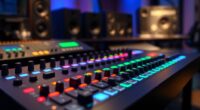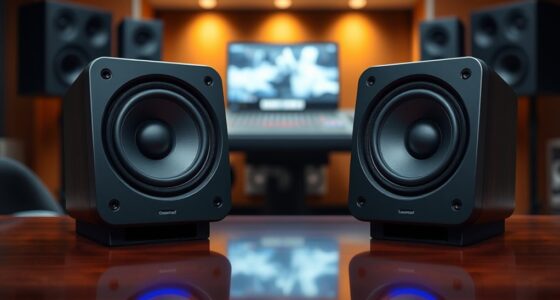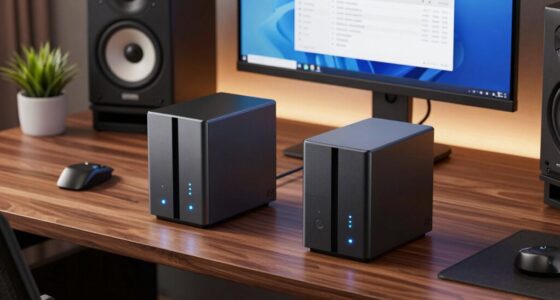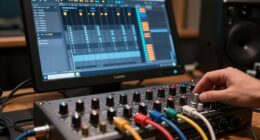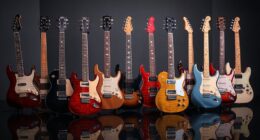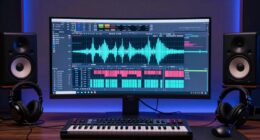Looking for the best budget MIDI keyboards that still offer great quality? I’ve tested models like the Donner DMK25 Pro, Akai MPK Mini MK3, and Ktaxon 88-Key Electric Piano. These options are portable, responsive, and come with useful features for beginners and hobbyists. They don’t compromise on performance or build, making them perfect for home studios or on-the-go music. Stick around, and I’ll guide you through what makes each of these stand out.
Key Takeaways
- Discover affordable MIDI keyboards with high-quality key action and reliable connectivity suitable for beginners and hobbyists.
- Many budget options include essential features like velocity-sensitive keys, MIDI/USB support, and portable designs.
- Top budget models often come with included accessories such as stands, pedals, and software for a complete setup.
- These keyboards offer a variety of sizes, from compact mini controllers to full-size keybeds, balancing portability and playability.
- They deliver excellent value without sacrificing sound quality, making them ideal for home practice, learning, and mobile music creation.
88-Key Semi-weighted Electronic Keyboard Piano with Stand, Sustain Pedal, MIDI/USB/MP3 for Beginners
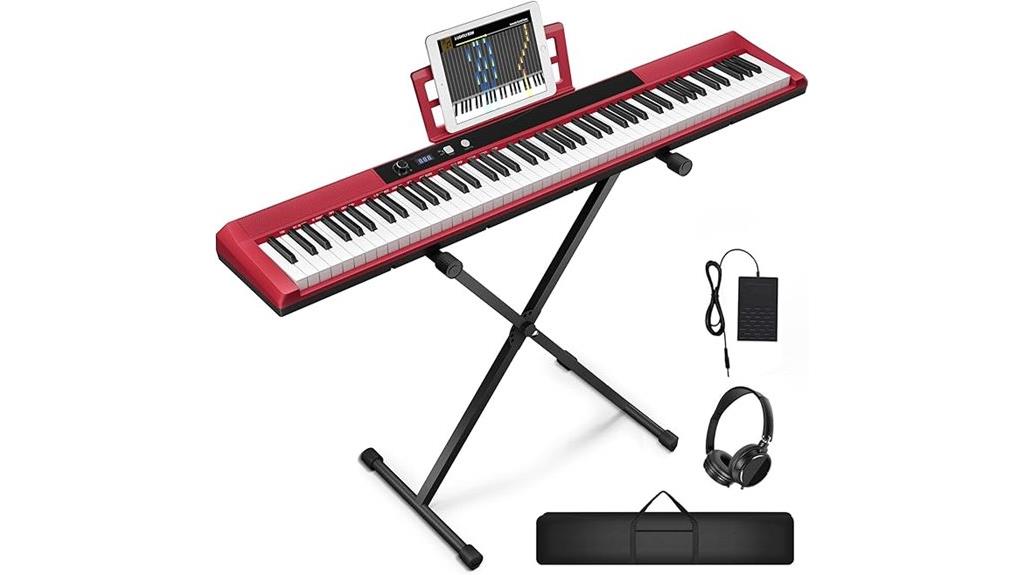
If you’re a beginner looking for a full-size, portable keyboard that offers essential features without breaking the bank, the Key Semi-weighted Electronic Keyboard Piano with Stand, Sustain Pedal, MIDI/USB/MP3 is an excellent choice. It features 88 semi-weighted keys that respond dynamically, making practice feel natural. The keyboard includes 128 preset rhythms, tones, and demo songs, perfect for exploring different sounds. With Bluetooth and MIDI connectivity, you can easily integrate it with software or wireless devices. Weighing just 15 pounds, it’s lightweight and portable, complete with a stand and sustain pedal, ideal for home, stage, or social playing.
Best For: beginners, students, and casual players seeking a full-size, portable keyboard with essential features for home practice or stage use.
Pros:
- Responsive semi-weighted keys that mimic real piano feel for dynamic playing.
- Wide variety of sounds, rhythms, and demo songs to explore musical creativity.
- Lightweight and portable design with included stand and sustain pedal, ideal for on-the-go use.
Cons:
- Some users find the semi-weighted keys to feel flimsy or less durable than fully weighted keys.
- Limited harmonic capacity and sound customization options compared to higher-end models.
- Basic build quality may not satisfy advanced players seeking more professional features.
Digital Piano Keyboard for Beginners, 88-Key Semi-Weighted Electric Piano with Stand & Accessories
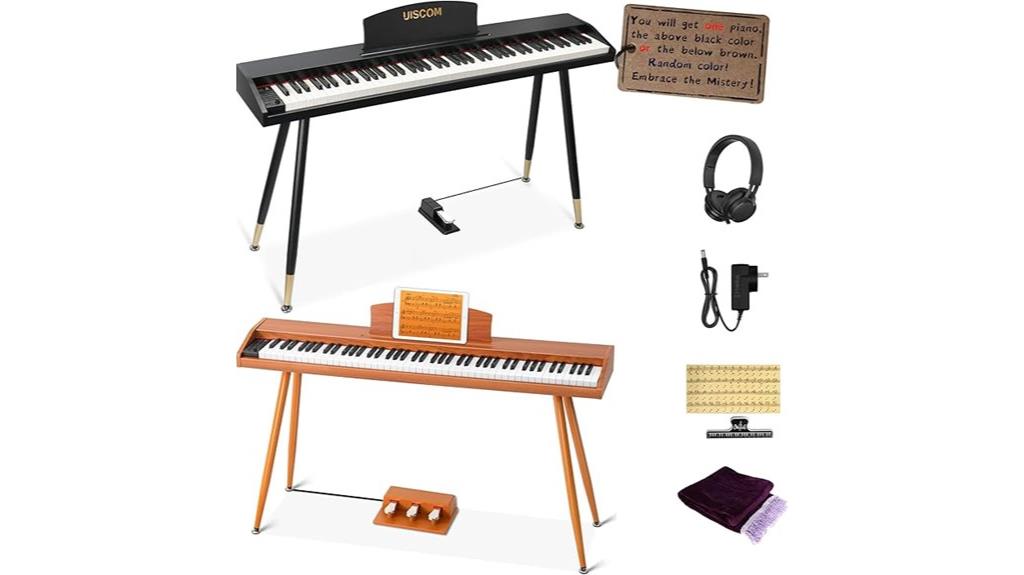
The UISCOM Digital Piano Keyboard stands out as an excellent choice for beginners who want a full-sized, semi-weighted keyboard that closely mimics the feel of an acoustic piano. Its 88 keys offer responsive touch, ideal for learning proper technique. The stylish wood grain finish and included stand, pedal, headphones, and accessories make setup easy and complete. Weighing just 31.9 pounds, it’s portable yet sturdy enough for home use. With 80 demo songs, 600 tones, and Bluetooth connectivity, it encourages exploration and practice. Overall, it’s a budget-friendly, user-friendly digital piano that balances realistic feel, features, and design for beginner players.
Best For: beginners and novice pianists seeking a full-sized, semi-weighted digital piano that’s portable, easy to set up, and offers a variety of features for learning and exploration.
Pros:
- Realistic 88-key semi-weighted keys that mimic acoustic piano touch, ideal for developing proper technique.
- Comprehensive package including stand, pedal, headphones, and music accessories, making it ready to use out of the box.
- Versatile features such as 80 demo songs, 600 tones, Bluetooth connectivity, and recording capabilities to enhance learning and creativity.
Cons:
- Keys are not fully weighted, which may be a drawback for advanced players seeking authentic hammer action.
- Limited sound variation compared to higher-end models with more advanced sound engines.
- Some users report minor issues with the stability or design of the music stand.
Digital Piano 88-Key Semi-Weighted Keyboard with Stand
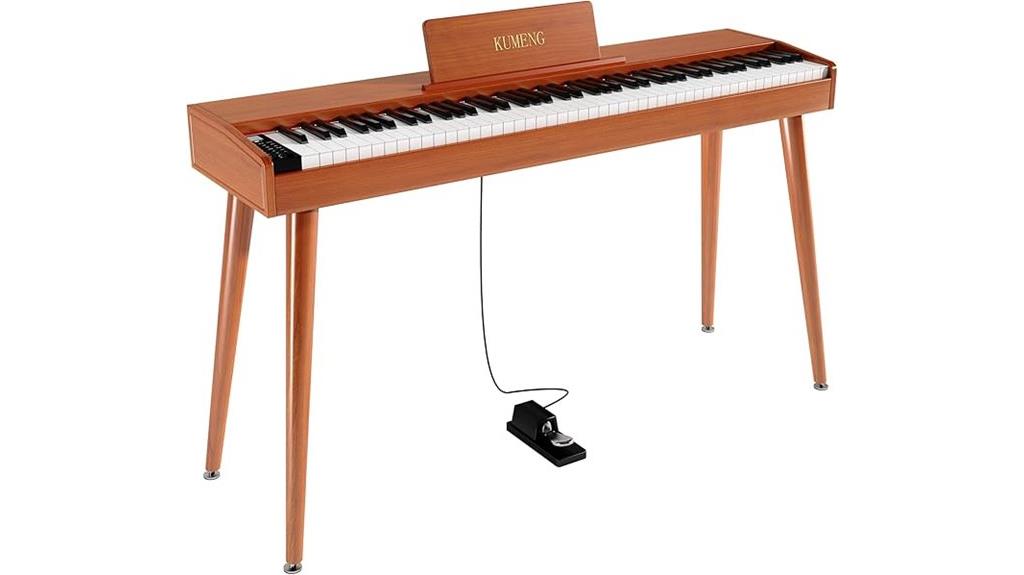
For beginners and learning musicians, the Digital Piano 88-Key Semi-Weighted Keyboard with Stand offers an ideal balance of realistic feel and versatility. Its full-size semi-weighted keys mimic the touch of an acoustic piano, making practice more authentic. Equipped with a sophisticated chip, it delivers 800 tones and 128-note polyphony, supporting expressive playing styles. The multi-functional control panel simplifies navigation, offering features like sound recording and split modes. Connectivity options, including USB/MIDI ports, allow easy integration with devices for accompaniment or recording. With a sleek matte finish and eco-friendly materials, it combines style and practicality, making it a perfect choice for home or teaching environments.
Best For: beginner and learning musicians seeking a realistic and versatile digital piano suitable for home practice and teaching environments.
Pros:
- 88 full-size semi-weighted keys provide an authentic piano feel.
- 800 diverse tones and 128-note polyphony support expressive and varied performances.
- Connectivity options like USB/MIDI enable easy device integration for recording and accompaniment.
Cons:
- May lack advanced features found in higher-end digital pianos.
- The semi-weighted keys, while realistic, might not satisfy professional pianists seeking fully weighted keys.
- The design and features may be limited for experienced players needing more sophisticated controls.
Donner DMK25 Pro MIDI Keyboard Controller
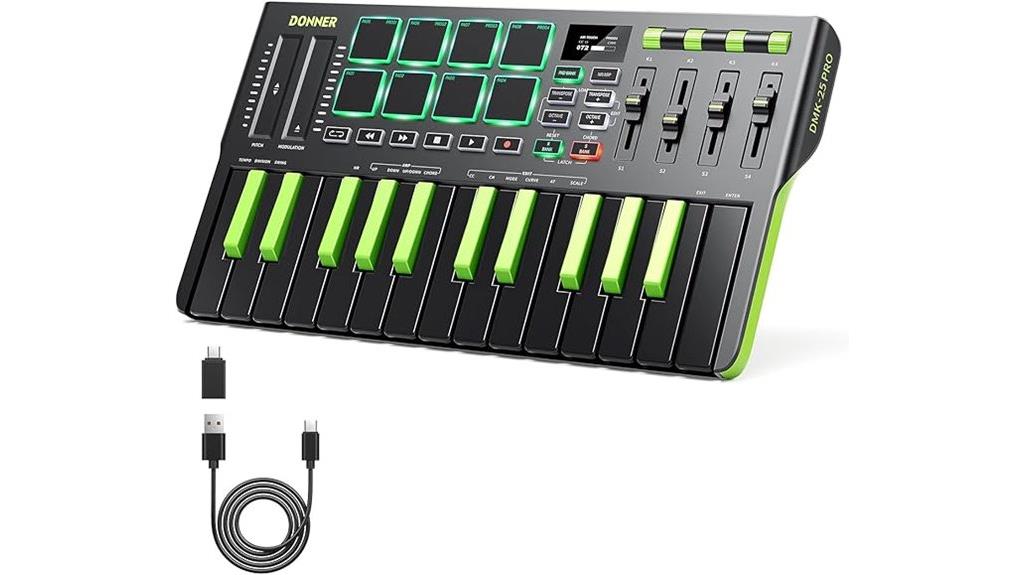
Designed with portability and versatility in mind, the Donner DMK25 Pro MIDI Keyboard Controller is an excellent choice for musicians who need a compact, feature-rich controller on the go. It has 25 mini keys, 8 drum pads, an OLED display, and a personalized touch bar, plus innovative wheels for control. Weighing just 2.53 pounds, it’s perfect for travel and easy to connect via USB Type-C to your computer or mobile device. Although it doesn’t produce sound alone, it offers dynamic scale modes, arpeggio, and chord controls that inspire creativity. With included software and courses, it’s a solid, budget-friendly option—ideal for beginners and mobile producers.
Best For: musicians, beginners, and mobile producers seeking a portable, versatile MIDI controller with essential features for music creation on the go.
Pros:
- Compact and lightweight design makes it highly portable and travel-friendly
- Responsive keys, drum pads, and intuitive controls enhance performance and creativity
- Includes software and educational courses suitable for beginners and advanced users
Cons:
- Setup and software installation can be complex and may require troubleshooting
- Limited customization in scale, arpeggio, and chord modes reduces flexibility for advanced users
- Some users report build quality concerns and software incompatibility issues
Akai MPK Mini MK3 USB MIDI Keyboard Controller

If you’re looking for an affordable, portable MIDI keyboard that doesn’t compromise on control, the Akai MPK Mini MK3 stands out. It features 25 velocity-sensitive mini keys, 8 backlit MPC-style drum pads with Note Repeat, and 8 assignable knobs for versatile tweaking. The 4-way thumbstick handles pitch and modulation, while the OLED display provides real-time feedback. Its compact, lightweight design makes it perfect for travel and studio use. With seamless DAW compatibility and bundled software like MPC Beats and Komplete 15 Select, it offers a exhaustive, user-friendly setup ideal for beginners and pros alike.
Best For: musicians, producers, and hobbyists seeking a portable, versatile MIDI controller with comprehensive control features suitable for both studio and travel use.
Pros:
- Compact, lightweight design ideal for portability and travel
- Responsive, velocity-sensitive keys and MPC-style drum pads for expressive performance
- Seamless integration with major DAWs and bundled software for quick setup and versatility
Cons:
- Smaller keys and firm feel may require adjustment for some players
- Limited physical controls compared to larger MIDI keyboards
- Software setup can pose a learning curve for beginners unfamiliar with DAWs
midiplus AKM320 Midi Keyboard Controller

The midiplus AKM320 Midi Keyboard Controller stands out for its compact size and intuitive features, making it an excellent choice for musicians on a budget who need a portable and versatile MIDI solution. It offers 32 velocity-sensitive mid-size keys that feel responsive and natural. The controller includes essential controls like a pitch wheel, modulation wheel, octave buttons, and transpose buttons, giving you plenty of creative flexibility. It connects easily via a USB B port, and a USB cable is included. Designed in Taiwan, it’s perfect for music production on the go, fitting seamlessly into any computer setup without sacrificing functionality.
Best For: musicians and music producers seeking a portable, budget-friendly MIDI keyboard with essential controls for music production and MIDI control.
Pros:
- Compact and lightweight design for easy portability
- Responsive 32 velocity-sensitive keys for expressive playing
- Includes essential controls like pitch wheel, modulation wheel, and octave/transpose buttons
Cons:
- No built-in display or advanced features for detailed editing
- Sustain pedal not included, requiring an additional purchase
- Limited to MIDI control; does not support standalone sound generation
M-VAVE 25-Key USB MIDI Keyboard Controller with Drum Pads and Bluetooth

The M-VAVE 25-Key USB MIDI Keyboard Controller stands out as an excellent choice for musicians who need portability without sacrificing functionality. Its compact design packs 25 velocity-sensitive mini keys, 8 RGB backlit pads, and 8 assignable rotary encoders, plus touch strips for pitch bending. It’s USB powered and supports Bluetooth, making wireless pairing easy with Windows, Mac, Android, and iOS devices. The built-in 2,000 mAh battery offers around 16 hours of use, perfect for mobile music creation. With features like smart chord functions and compatibility with major DAWs, it’s versatile for studio, live, or on-the-go use, all at an affordable price.
Best For: musicians, producers, and songwriters seeking a portable, versatile MIDI controller with wireless connectivity and comprehensive controls for studio and live performance.
Pros:
- Compact and portable design ideal for on-the-go music production
- Wireless Bluetooth support for seamless device pairing
- Features like smart chord functions and extensive DAW compatibility enhance workflow
Cons:
- Limited 25 keys may not suffice for complex melodic arrangements
- Battery life, while impressive, may require frequent charging during intensive use
- Small size can be less comfortable for extended playing sessions compared to full-sized keyboards
AKAI Professional LPK25 USB MIDI Keyboard Controller
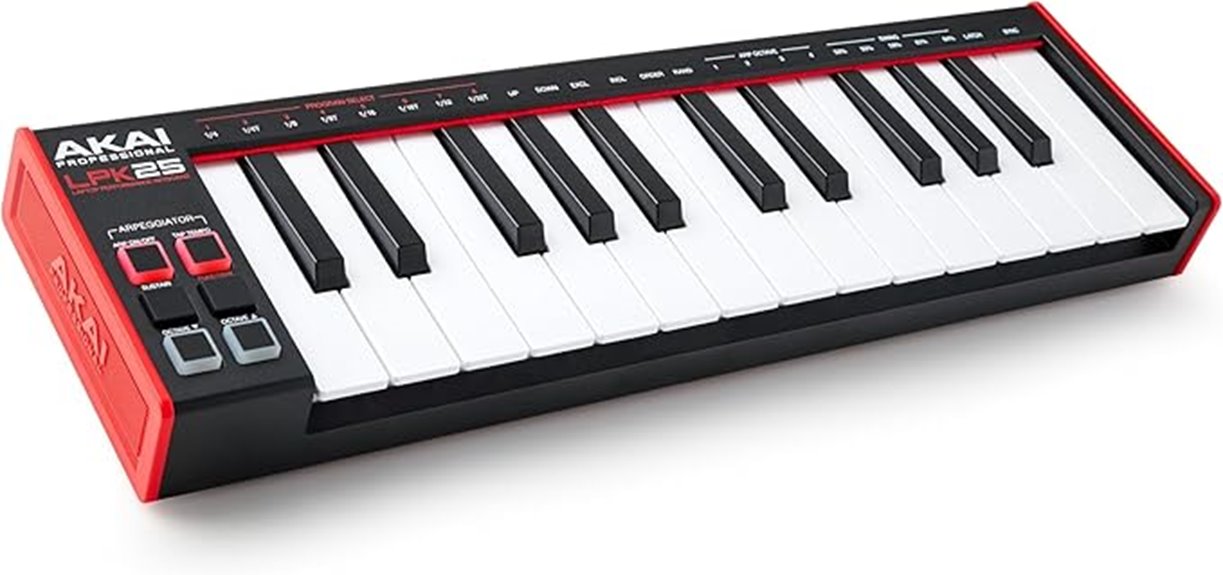
For musicians on the go, the AKAI Professional LPK25 USB MIDI Keyboard Controller stands out as an ideal budget-friendly option. Its compact design, weighing less than a pound and fitting into small bags, makes it perfect for travel and tight spaces. The 25 keys feature responsive synth-action with dynamic velocity, offering an expressive playing experience. It includes essential controls like octave up/down, sustain, and an arpeggiator, along with 8 programmable preset slots for custom setups. Compatible with Mac and PC, it connects via USB with plug-and-play ease, making it a versatile, reliable choice for beginners and pros alike.
Best For: musicians, producers, and music creators seeking a portable, budget-friendly MIDI controller for travel, songwriting, and performance.
Pros:
- Compact and lightweight design for easy portability and travel.
- Responsive synth-action keys with dynamic velocity for expressive playing.
- Seamless plug-and-play USB connectivity compatible with Mac and PC.
Cons:
- Slight looseness in the USB socket may affect durability for some users.
- Limited keys (25) may not suit complex piano arrangements or advanced performances.
- Fewer advanced controls compared to larger MIDI controllers, potentially limiting customization.
Donner Mini MIDI Keyboard, N-25 25-Key MIDI Controller
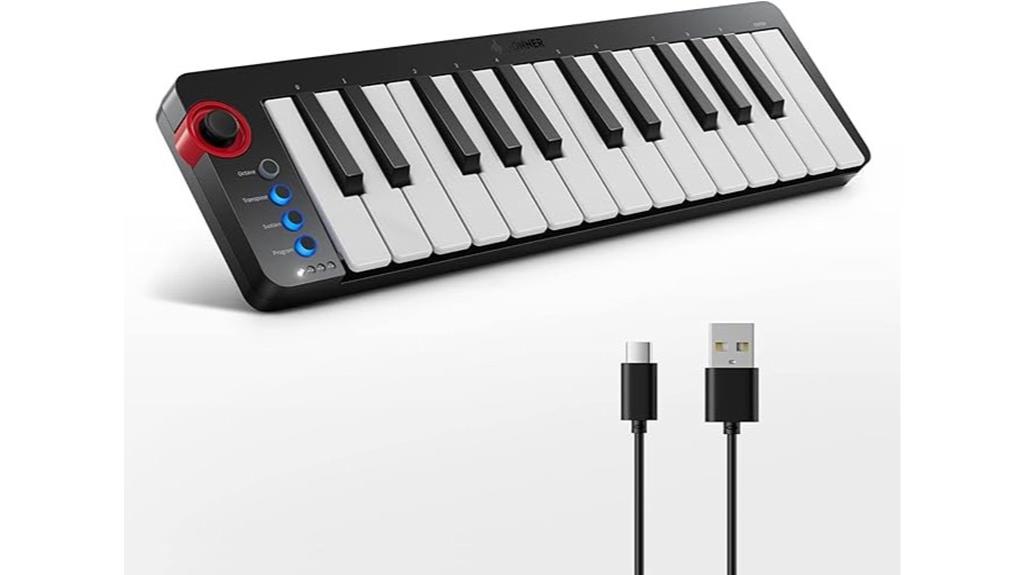
If you’re looking for a portable MIDI controller that delivers expressive control without breaking the bank, the Donner Mini MIDI Keyboard, N-25 25-Key MIDI Controller is an excellent choice. Its compact design features 25 velocity-sensitive mini keys, perfect for creating melodies on the go. The light-up buttons give clear visual feedback, while the pitch-bend wheel adds expressive control. Plug-and-play connectivity works seamlessly with Mac, iOS, PC, and mobile devices via USB-MIDI, with no extra drivers needed. Ideal for beginners, it includes helpful features like arpeggiator, sustain, and four user banks, plus 40 educational courses to boost your skills.
Best For: beginners and mobile musicians seeking an affordable, portable MIDI controller with expressive features and educational support.
Pros:
- Compact and lightweight design ideal for portability and small setups
- Plug-and-play connectivity with multiple devices without extra drivers
- Includes educational courses to enhance learning and creative skills
Cons:
- Limited to 25 keys, which may not suit advanced or complex compositions
- Basic features might require additional software or hardware for advanced production
- Light-up buttons and mini keys can be less comfortable for extended playing sessions
Akai Professional MPK Mini Plus USB MIDI Keyboard Controller
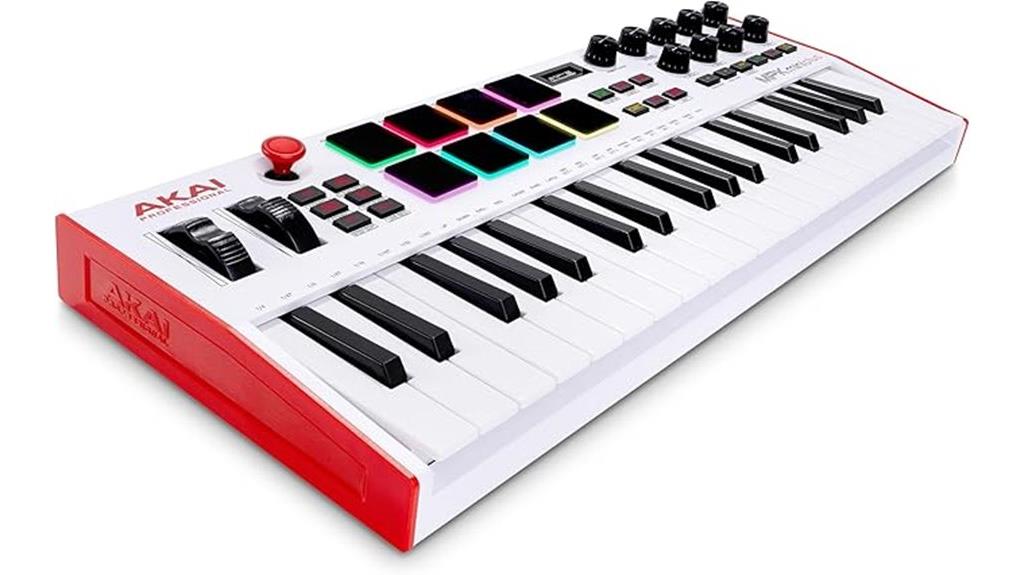
Akai Professional MPK Mini Plus stands out as a top choice for musicians seeking versatile, portable control at an affordable price. It features a 37-key mini keyboard spanning three octaves, perfect for melodic and harmonic performances. The 8 MPC pads offer excellent drum programming and control options, enhancing creative expression. Connectivity is flexible with USB power, MIDI, and CV/Gate ports, allowing integration with various gear. Its built-in 64-step sequencer supports standalone music creation, and with NKS support, you can easily access sound libraries. The limited white edition combines solid performance with sleek design, making it ideal for both studio and live setups.
Best For: musicians and producers seeking a portable, versatile MIDI controller with extensive connectivity and standalone music creation features suitable for studio or live performance.
Pros:
- Compact 37-key mini keyboard ideal for melodic and harmonic performances
- Multiple connectivity options including USB, MIDI, and CV/Gate ports for versatile integration
- Built-in 64-step sequencer and NKS support for standalone use and seamless sound library access
Cons:
- Limited to one drum and one melodic/chord track in standalone mode, which may restrict complex compositions
- Smaller keys might be less comfortable for players used to full-sized keyboards
- Advanced features may have a learning curve for beginners unfamiliar with MIDI and sound module setups
61-Key Digital Piano with Built-In Speakers and Microphone, Portable Electronic Keyboard for Beginners and Kids
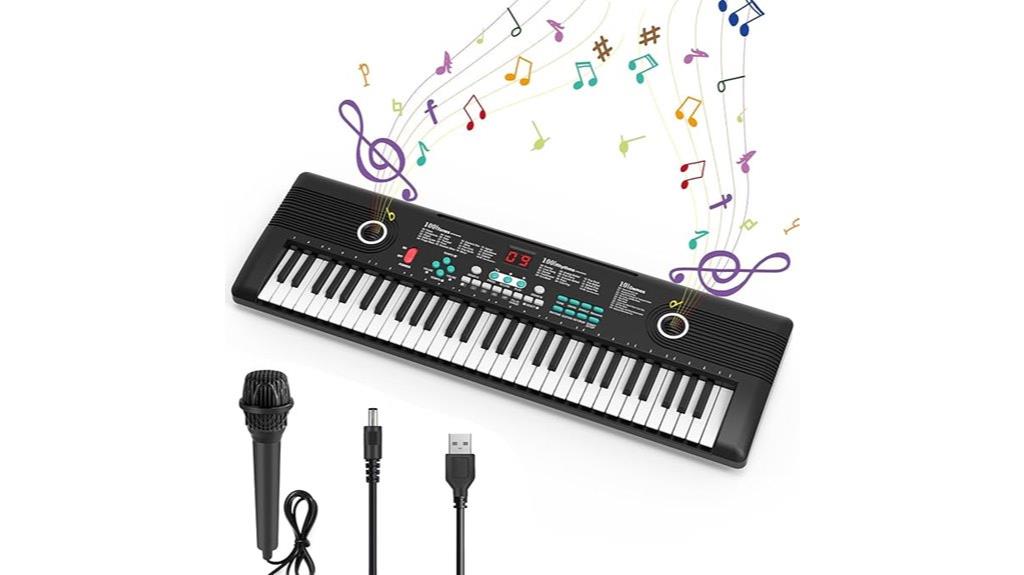
A 61-key digital piano with built-in speakers and a microphone is an excellent choice for beginners and kids who want an all-in-one instrument that combines playing, singing, and recording. It features 100 rhythms, 100 tones, and 10 demo songs to keep learners engaged. Its LCD screen makes navigation easy, and the recording function helps track progress. Made of eco-friendly plastic, it’s lightweight and portable, perfect for home or outdoor use. With volume control and multiple modes, this keyboard encourages musical exploration and confidence-building. It’s a fun, safe, and versatile option for young musicians and newcomers to music.
Best For: beginners, kids, and music enthusiasts seeking a portable, all-in-one digital piano for learning, practicing, and entertainment.
Pros:
- Features 61 keys with multiple sound and rhythm options to inspire creativity.
- Built-in speakers and microphone allow for singing along and recording sessions.
- Lightweight and portable design makes it easy to carry for outdoor and travel use.
Cons:
- Power supply requires a DC 5V adapter or batteries, which are not included.
- Limited to 61 keys, which may be less suitable for advanced players needing a full-sized keyboard.
- Eco-friendly plastic construction, while safe, may be less durable than higher-end materials.
88-Key Semi-Weighted Keyboard Piano for Beginners with MIDI, Bluetooth, 1000 Tones and Rhythms
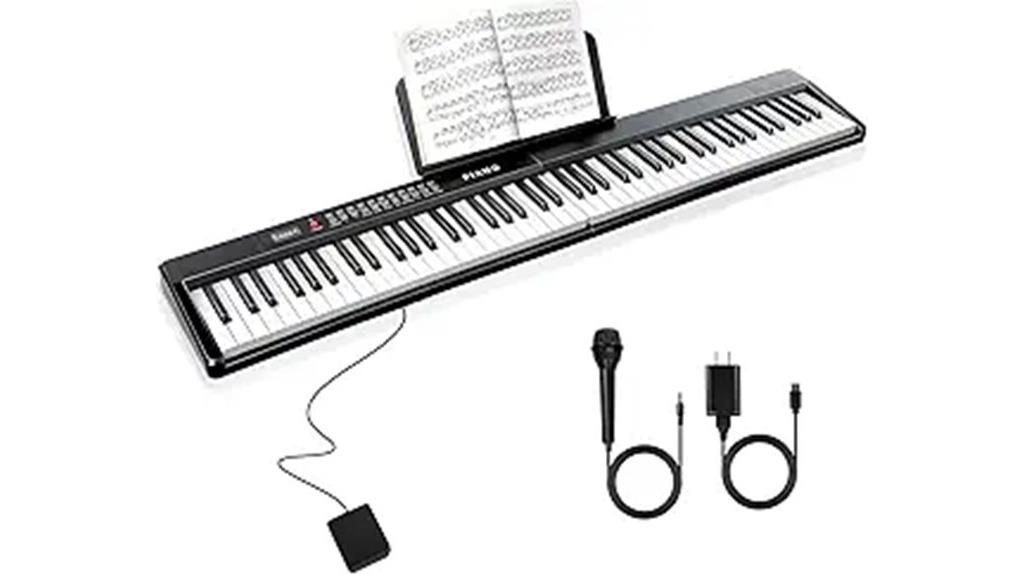
This semi-weighted 88-key keyboard is an excellent choice for beginners who want a versatile and portable instrument with advanced connectivity features. It offers Bluetooth, MIDI, and MP3 compatibility, making it easy to connect to devices for recording or learning apps. With 1000 tones and rhythms plus 150 demo songs, it provides plenty of sound options for experimentation. Its foldable design enhances portability, perfect for practicing anywhere. The keyboard includes essential accessories like a sustain pedal, microphone, and music stand. With an LED screen and multiple functions, it’s user-friendly and ideal for beginners enthusiastic to explore a wide range of sounds and features without breaking the bank.
Best For: beginners and students seeking an affordable, versatile, and portable digital piano with extensive sound options and connectivity features.
Pros:
- Features 88 semi-weighted keys that mimic traditional piano touch, ideal for beginners.
- Offers a wide range of sounds with 1000 tones, 1000 rhythms, and 150 demo songs for experimentation.
- Includes essential accessories like sustain pedal, microphone, and music stand, plus multiple connectivity options such as Bluetooth and USB MIDI.
Cons:
- Build quality may be flimsy, with reports of fragile accessories and stability issues.
- Speakers and included headphones may have underwhelming sound quality.
- Limited instruction guidance and durability concerns with components like the music stand and headphone cushions.
Ktaxon 88 Key Electric Piano Keyboard
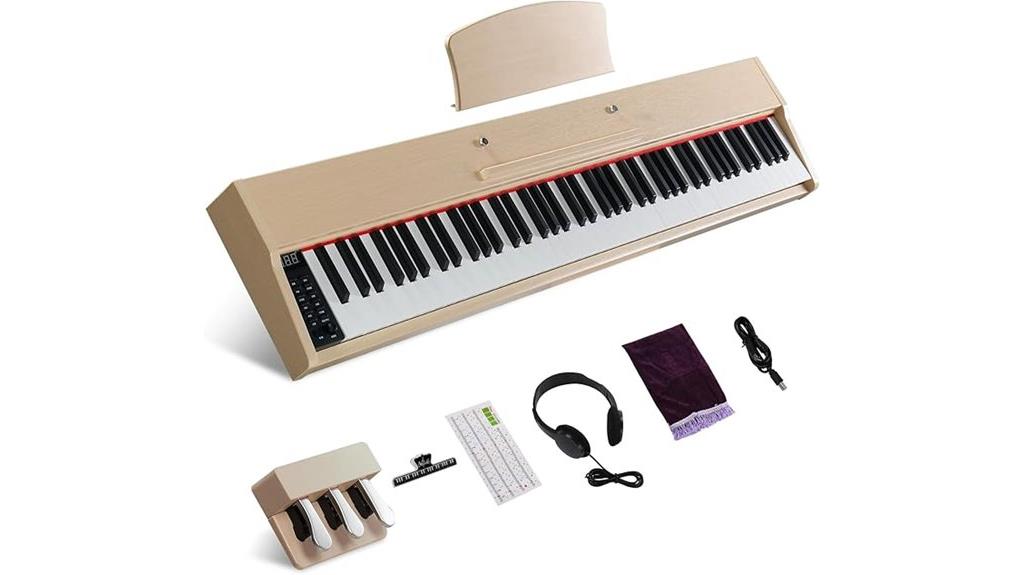
The Ktaxon 88 Key Electric Piano Keyboard stands out as a top choice for beginner and intermediate players seeking an affordable yet realistic playing experience. Its semi-weighted keys deliver responsive touch and nuanced dynamics, perfect for evolving skills. The three pedals add expressive options, while the built-in 128 tones and 128 rhythms offer versatility for practice and creativity. Its compact, stylish design with a woodgrain finish makes it ideal for home use, and the included dust cover keeps it protected. With Bluetooth, USB, and MIDI connectivity, it’s easy to integrate into your setup. Overall, it provides excellent value without sacrificing key features for aspiring musicians.
Best For: beginner and intermediate players seeking an affordable, full-sized digital piano with realistic touch and versatile features for home practice and learning.
Pros:
- Semi-weighted keys provide a responsive and nuanced playing experience suitable for evolving skills.
- Built-in 128 tones and 128 rhythms offer versatile sound options for practice and creativity.
- Compact design with woodgrain finish makes it stylish and suitable for home use, with no assembly required.
Cons:
- Some users report limited built-in sound options, which may affect advanced sound customization.
- Pedal and headphone quality issues have been noted by a few users, potentially impacting practice quality.
- The overall sound quality, while good for beginners, may not meet professional performance standards.
Rengue Keyboard Piano for Kids with Teaching Mode and 150 Demo Songs
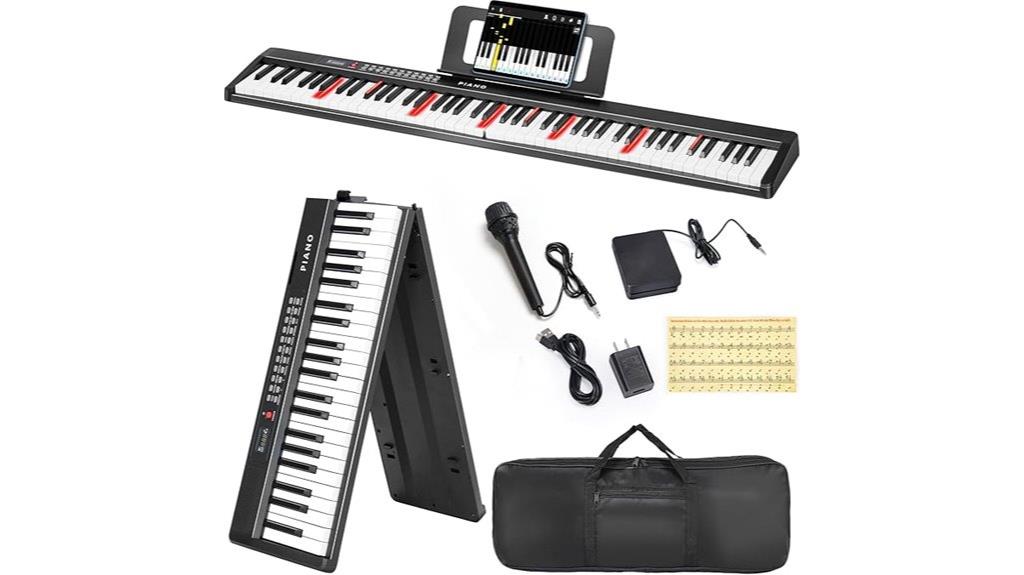
Designed specifically for young beginners, the Rengue Keyboard Piano combines user-friendly features with engaging educational tools. It has 61 keys with an 88-key feel, making it comfortable for kids learning piano. With over 1,000 instrument tones, rhythms, and 150 demo songs, it encourages exploration and creativity. The built-in teaching modes and light-up keys help kids learn songs, including classical pieces. Its portable, foldable design and USB charging make it ideal for practice on the go. Plus, the included note stickers and compatibility with Simply Piano make it a versatile, fun, and effective beginner instrument for young learners.
Best For: beginner children and novice music learners seeking a portable, educational, and engaging keyboard piano to develop musical skills.
Pros:
- User-friendly with light-up keys and built-in teaching modes that facilitate learning songs and music theory.
- Offers extensive sound options, including 1000 instrument tones, rhythms, and 150 demo songs to inspire creativity.
- Portable and foldable design with USB charging and long battery life, ideal for practice anywhere.
Cons:
- Some users report minor durability issues or sound quality concerns.
- Limited advanced features for more experienced or professional musicians.
- May require gentle handling to maintain longevity, especially with frequent transport or young children.
Donner USB-C MIDI Keyboard Controller (DMK 25 Pro Black)
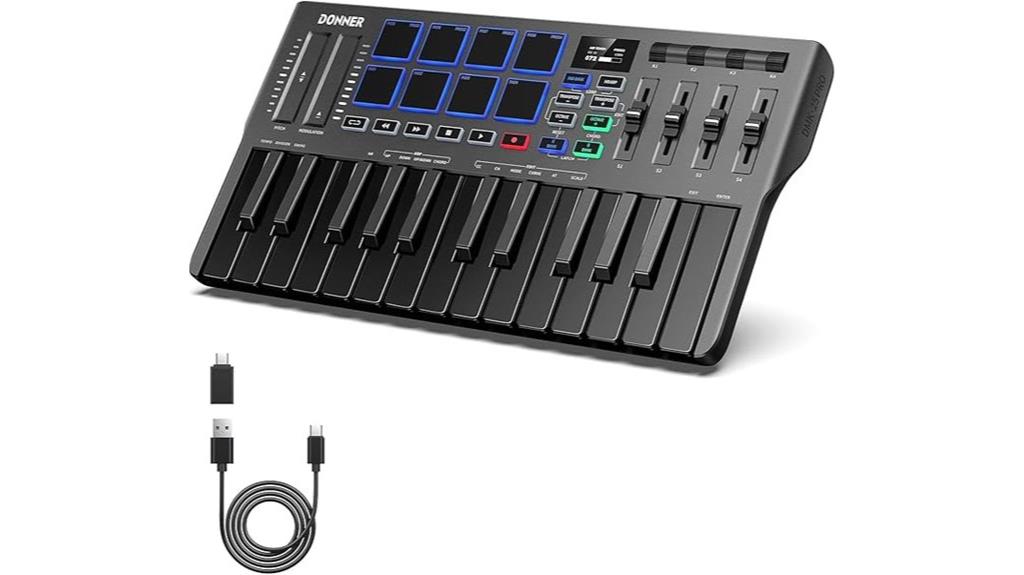
If you’re looking for a portable MIDI controller that combines affordability with a robust feature set, the Donner DMK 25 Pro Black stands out as an excellent choice. This compact 25-key mini keyboard offers velocity-sensitive keys and pads, an OLED display, and smart scales to inspire creativity. It includes arpeggio, note repeat, and chord functions, plus a personalized touch bar with light scale for intuitive control. Designed for PC, tablets, and smartphones via USB-C, it’s perfect for music on the go. While setup can be tricky and software may be complex, its lightweight build and extensive features make it a solid budget option for beginners and casual producers.
Best For: beginners, casual musicians, and portable music producers seeking an affordable, feature-rich MIDI controller for on-the-go music creation.
Pros:
- Compact, lightweight, and highly portable design ideal for mobile use
- Rich feature set including smart scales, arpeggio, note repeat, and teaching courses
- Compatible with multiple devices and popular DAWs, enhancing versatility
Cons:
- Setup can be complex, especially on Windows 10, with some users facing installation issues
- Software and plugin versions are lite, requiring additional purchases for full features
- Some users report inconsistent pad sensitivity and key action, affecting playability
Factors to Consider When Choosing a Budget MIDI Keyboard
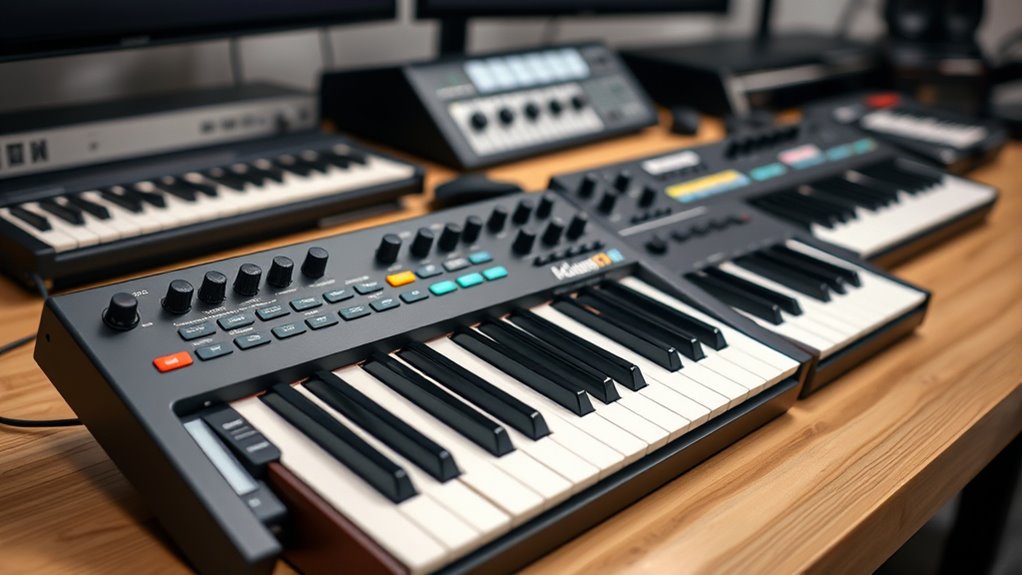
When choosing a budget MIDI keyboard, I consider factors like key feel, compatibility, and connectivity to guarantee it fits my setup. I also look at software features, portability, and overall design to match my workflow and space. Understanding these points helps me pick a controller that delivers great performance without overspending.
Key Feel and Action
Choosing the right key feel and action is vital because it directly influences how comfortable and expressive your playing experience will be. The type of keys—synth-action, semi-weighted, or fully weighted—affects responsiveness and dynamics. Semi-weighted keys strike a good balance, offering a more expressive touch that’s ideal for beginners. Fully weighted keys mimic acoustic pianos, providing resistance and depth preferred by advanced players, but they can be less responsive for quick passages. Velocity sensitivity is also essential, as it determines how the keyboard responds to different playing intensities, enhancing expressiveness. Additionally, the feedback and rebound speed of the keys impact playing comfort and technique development. Considering these factors helps ensure your MIDI keyboard supports both your current skill level and future growth.
Compatibility With Devices
Selecting a MIDI keyboard that seamlessly connects to your device requires verifying its compatibility with your hardware and software. First, check the connection type—whether USB Type-A, Type-C, or Bluetooth—to match your setup. Make sure the keyboard is compatible with your operating system, like Windows, macOS, iOS, or Android, for smooth integration. It’s also important to see if it’s plug-and-play or if it needs drivers or additional software, which can affect setup time. Additionally, confirm that the MIDI keyboard works with your digital audio workstation (DAW) or music software, so you can maximize its features. If you prefer a wireless setup, consider whether the keyboard supports Bluetooth or other wireless options. Compatibility guarantees hassle-free use and full functionality.
Control and Connectivity
To get the most out of a budget MIDI keyboard, it’s important to focus on control and connectivity options that match your creative needs. Look for devices with compatible connectivity options like USB, MIDI, or Bluetooth, ensuring seamless integration with your computer, tablet, or hardware gear. Control features such as assignable knobs, sliders, drum pads, or modulation wheels can markedly enhance your creative expression without adding cost. Check that the keyboard works smoothly with your preferred DAWs and music apps to avoid setup headaches. Consider key responsiveness—velocity-sensitive keys or semi-weighted actions can improve playing feel. Additionally, features like preset mappings, teaching modes, or bundled software can add value, helping you get more from your budget-friendly option.
Software and Features
When evaluating budget MIDI keyboards, it’s important to make certain they are compatible with your preferred DAW, supporting standard protocols like MIDI over USB or MIDI DIN for seamless integration. Beyond compatibility, consider built-in features like drum pads, knobs, sliders, and control buttons that boost your creative control and workflow. Some keyboards include educational tools, preset sounds, or onboard recording capabilities, which are great for learning and experimenting. Check if the software bundle offers virtual instruments, sound libraries, or tutorials to support your musical development. Lastly, verify the setup process is straightforward, drivers are easy to install, and there are updates or support resources available. These factors help verify your MIDI keyboard complements your setup and enhances your production experience.
Portability and Design
Portability and design are key considerations that can considerably influence how you use your MIDI keyboard, especially if you’re frequently on the move. A lightweight model, typically under 3 pounds, makes transportation effortless without sacrificing functionality. Slim profiles and minimal bulk enhance ease of carrying and storage, perfect for mobile music production or practice sessions. Features like foldable or detachable stands further improve portability, allowing you to set up quickly anywhere. Wireless connectivity options such as Bluetooth or Wi-Fi reduce cable clutter and streamline setup during performances. Durability is also essential; a well-constructed keyboard with high-quality materials ensures it can withstand frequent travel and handling. Balancing a compact, stylish design with sturdy build quality helps you stay mobile without compromising on performance.
Frequently Asked Questions
Can Budget MIDI Keyboards Support Professional Recording Software?
When considering if budget MIDI keyboards support professional recording software, I find that many do. They typically use standard MIDI protocols, so they’re compatible with most Digital Audio Workstations (DAWs) like Ableton Live, FL Studio, or Logic Pro. As long as the keyboard connects via USB or MIDI, and the driver is properly installed, you’ll enjoy professional-level functionality without breaking the bank.
Are There Any Durability Concerns With Low-Cost MIDI Controllers?
Think of a budget MIDI controller as a trusty steed—solid enough to carry you through creative journeys. While some low-cost models might have minor creaks or less sturdy keys, most are designed to withstand regular use. I’ve found that reading reviews helps spot potential durability issues. With proper care, even affordable controllers can be reliable partners, making music without worry or disappointment.
Do Budget MIDI Keyboards Include Useful Learning or Practice Features?
When it comes to budget MIDI keyboards, I find many models include handy learning features like built-in drum pads, transport controls, and even beginner modes. These features help me practice and improve my skills without needing extra gear. While not all budget options have advanced features, I appreciate that many offer enough tools to make learning easier and more engaging, making them a great starting point for new producers.
How Compatible Are Affordable MIDI Keyboards With Smartphones and Tablets?
You won’t believe how surprisingly compatible affordable MIDI keyboards are with smartphones and tablets! I’ve tested several, and most easily connect via USB or Bluetooth, making music creation almost effortless. Even budget options now support popular apps and DAWs, so you can jam, record, or learn on the go without breaking the bank. It’s incredible how these compact devices pack such big compatibility punch—perfect for musicians on a budget!
What’S the Typical Lifespan of a Budget MIDI Keyboard With Regular Use?
You’re wondering about the lifespan of a budget MIDI keyboard with regular use. In my experience, these keyboards typically last around 3 to 5 years, depending on how well you care for them. Proper handling, avoiding spills, and regular cleaning can extend their life. While they may not be as durable as premium models, a well-maintained budget MIDI keyboard can serve you reliably for quite some time.
Conclusion
So, if you’re looking to plunge into music without stretching your budget too thin, these options offer a gentle balance of quality and affordability. They might not boast all the bells and whistles of high-end models, but they’re more than capable of nurturing your musical journey. Remember, the right keyboard is the one that feels just right for you—so take your time, explore your options, and let your passion lead the way.


